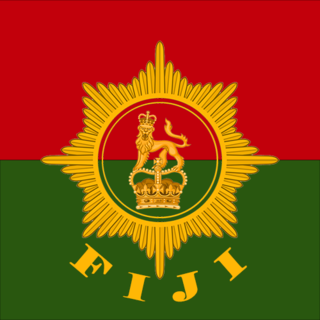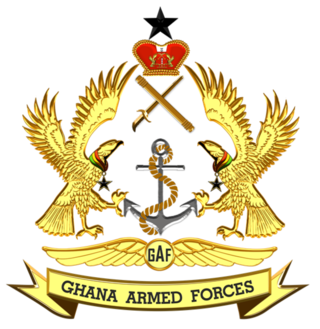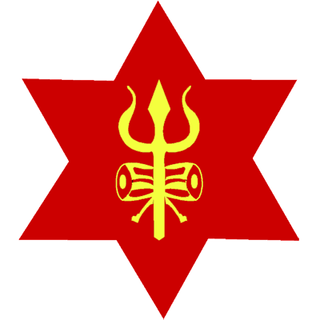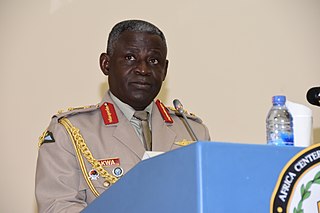
The Republic of Fiji Military Forces is the military force of the Pacific island nation of Fiji. With a total manpower of about 6,500 active soldiers and approximately 6,200 reservists, it is one of the smallest militaries in the world and the third largest in the South Pacific region. The Ground Force is organised into six infantry and one engineer battalions.

The Ghana Armed Forces (GAF) is the state military organisation of Ghana, consisting of the Army (GA), Navy (GN), and Ghana Air Force.

The Kenya Defence Forces (KDF) are the armed forces of the Republic of Kenya. They are made up of the Kenya Army, Kenya Navy, and Kenya Air Force. The current KDF was established, and its composition stipulated, in Article 241 of the 2010 Constitution of Kenya; it is governed by the KDF Act of 2012. Its main mission is the defence and protection of the sovereignty and territorial integrity of Kenya, recruitment to the KDF is done on yearly basis. The President of Kenya is the commander-in-chief of the KDF, and the Chief of Defence Forces is the highest-ranking military officer, and the principal military adviser to the President of Kenya.

The Irish Army is the land component of the Defence Forces of Ireland. The Irish Army has an active establishment of 7,520, and a reserve establishment of 3,869. Like other components of the Defence Forces, the Irish Army has struggled to maintain strength and as of April 2023 has only 6,322 active personnel, and 1,382 reserve personnel. The Irish Army is organised into two brigades.
Commandant is a title often given to the officer in charge of a military training establishment or academy. This usage is common in English-speaking nations. In some countries it may be a military or police rank. It is also often used to refer to the commander of a military prison or prison camp.

General Johan Ivar Hederstedt is a senior Swedish Army officer. Hederstedt was commissioned as an officer in 1966 and went on to serve as a second lieutenant in the Älvsborg Regiment. In 1981, he embarked on a United Nations mission to the volatile region of Cyprus, a commitment that was followed by another overseas assignment in 1988 when he assumed command of a UN battalion in Lebanon. Throughout the 1990s, Hederstedt held various significant roles within the military, including serving as the brigade commander of the Life Guards Brigade, the commander of the Western Army Division, the deputy chief of the operations leadership for international operations, and a military expert at the Ministry of Defence. In the year 2000, he assumed the position of Supreme Commander of the Armed Forces. Remarkably, his tenure in this role lasted only three years, making him the shortest-serving Supreme Commander in history.

The United Nations Mission in Liberia (UNMIL) was a United Nations peacekeeping operation established in September 2003 to monitor a ceasefire agreement in Liberia following the resignation of President Charles Taylor and the conclusion of the Second Liberian Civil War (1999–2003). At its peak it consisted of up to 15,000 UN military personnel and 1,115 police officers, along with civilian political advisors and aid workers.

The United Nations Disengagement Observer Force (UNDOF) is a United Nations peacekeeping mission tasked with maintaining the ceasefire between Israel and Syria in the aftermath of the 1973 Yom Kippur War. The mission was established by United Nations Security Council Resolution 350 on 31 May 1974, to implement Resolution 338 (1973) which called for an immediate ceasefire and implementation of United Nations Security Council Resolution 242.

The Sri Lanka Army is the oldest and largest of the Sri Lanka Armed Forces. The army was officially established as the Ceylon Army in 1949, though the army traces its roots back in 1881 when Ceylon Light Infantry Volunteers was created; the army was renamed as the 'Sri Lanka Army' when Sri Lanka became a republic in 1972. In 2024, the Army had approximately 150,000 personnel.
Adetunji Idowu Ishola Olurin mni was a Nigerian general who served as the military Governor of Oyo State from 1985 to 1988 and Field Commander of ECOMOG Peacekeeping Force in Liberia from 1992 to 1993 during the First Liberian Civil War. Olurin retired from service in 1993, and was a member of Peoples Democratic Party (PDP). He was administrator of Ekiti State from 19 October 2006 until 27 April 2007.

This article is about women in warfare and the military (2000–present) throughout the world outside the United States. For women in warfare and the military in the United States since 2000, please see: Timeline of women in warfare and the military in the United States, 2000–2010 and Timeline of women in warfare and the military in the United States, 2011–present.

The Nepali Army, also referred to as the Gorkhali Army, is the land service branch of the Nepali Armed Forces. After the Gorkha Kingdom was founded in 1559, its army was established in 1560, and initially became known as the Gorkhali Army. Later it was known as the Royal Nepali Army (RNA) following the Unification of Nepal, when the Gorkha Kingdom expanded its territory to include the whole country, by conquering and annexing the other states in the region, resulting in the establishment of a single united Hindu monarchy over all of Nepal. It was officially renamed simply to the Nepali Army on 28 May 2008, upon the abolition of the 240-year-old Nepalese monarchy, and of the 449-year-old rule of the Shah dynasty, shortly after the Nepalese Civil War.

Franciszek Gągor was a Polish general, Chief of the General Staff of the Polish Armed Forces between 2006 and 2010.
General Shavendra Silva, is a Sri Lanka Army four star general who is the current Chief of Defence Staff, the head of the Sri Lanka Armed Forces serving from 1 January 2020. He also served as the Commander of the Sri Lanka Army from 19 August 2019 to 31 May 2022. His other important appointments include, Chief of Staff of the army, Adjutant General and Director of Operations of the Army. During the Sri Lankan civil war he gained fame as the General Officer Commanding of the elite 58 Division. He had also served as the Deputy Permanent Representative to the United Nations Headquarters.

Michael Beary is a retired Irish Army Major general and former head of mission and force commander of the United Nations Interim Force in Lebanon (UNIFIL). Beary is the current leader of the UN Mission to Support the Hodeidah Agreement, having retired from the military.

Lieutenant General Obed Boamah Akwa is a retired Ghanaian military officer who served as the Chief of the Defence Staff of the Ghana Armed Forces from February 2017 to February 2021. Prior to his appointment, he was the Chief of Army Staff of the Ghana Armed Forces.

Lieutenant General Simon Andrew Stuart, is a senior officer of the Australian Army who has served as the Chief of Army since July 2022. He was commissioned into the Royal Australian Infantry Corps from the Royal Military College, Duntroon in 1990. He has commanded the 8th/9th Battalion, Royal Australian Regiment (2008–10), Joint Task Force 631 (2010) and Combined Team Uruzgan (2012–13), and deployed to East Timor as part of Operations Warden, Tanager and Astute and to Afghanistan and the Sinai Peninsula. He was Force Commander, Multinational Force and Observers in the Sinai from 2017 to 2019, and Head Land Capability from 2020 to 2022. He succeeded Lieutenant General Rick Burr as Chief of Army on 2 July 2022.
Lt. Col. Richard Brennan is a Barrister-at-Law in the Legal Service of the Irish Defence Forces (IDF) and former National Legal Advisor to the IDF during United Nations peacekeeping operations as a United Nations Military Observer. He is a legal scholar on international humanitarian law and the legal basis of peacekeeping missions.
The Peacekeeping Unit is a battalion of the Islamic Republic of Iran Army Ground Force tasked with peacekeeping missions overseas and assigning personnel contributed by Iran to the United Nations peacekeeping.
Jone Logavatu Kalouniwai is a major general in the Republic of Fiji Military Forces (RFMF) who currently serves as the commander of the Republic of Fiji Military Forces since 16 September 2021. Previously named as director general of National Security and Intelligence, Ministry of Defence and National Security from May 2020 to September 2021, he also served as section commander in Lebanon and instructor at the RFMF Training School.














